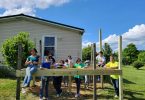Doubting Disciples
By Bishop Chris Giesler
Preaching Text: John 20:19-31
As the Gospel is read on the 2nd Sunday of Easter, we are a week away from the Easter celebration. On that day, the assigned Gospel lesson from John gave us to account of Mary Magdalene and her conversation with Jesus at the tomb early on Easter morning. With tears in her eyes and grief in her heart, Mary finds who she thinks is the gardener asking him where Jesus’ body had been taken. She had seen that the tomb’s stone had been rolled away and that the tomb was now empty. Her first thought, however, is that Jesus’ body has been stolen. The “gardener” listens to Mary’s pleading but then calls her by name, and at that moment, she knows it is Jesus.
Over the next few Sundays, we will be examining a series of these post-resurrection encounters. In each of them, we will find ourselves in the life situations of these disciples. We will also listen to some of Jesus’ most profound teachings as we seek to live in response to the Easter miracle.
This week, our scripture passage shifts from Mary’s encounter with Jesus to the disciples who, out of fear, have locked themselves in a room somewhere in Jerusalem. As we hear these words, we must remember that this is happening on the evening of that first Easter. As such, they do not fully understand what is happening around them. They feared being “next” on the hit list of the Roman authorities. And so their reaction is to move into hiding. Notice, however, the response that Jesus gives them. His first words are, “Peace be with you.”
Jesus’ response to their not being there after his arrest is, “Peace be with you.” His response to their not being at the cross is, “Peace be with you.” His response to Peter’s denial of him three times is, “Peace be with you.” His response to their being locked up in this room with fear is, “Peace be with you.”
Jesus here is extending a gracious word of forgiveness to them. And his command to them is that they forgive others just as he forgives them. His first words to them were not condemnation for having deserted him, but he extends peace to them in their moment of fear. That is an act of forgiveness. We, as disciples today, should also make note of this. Central to our mission is living a life of grace towards others.
This passage also brings to our attention a little-known disciple named Thomas. We don’t know why Thomas was absent during this encounter, but when he does return, his fellow disciples tell him of their encounter with Jesus. His reaction, however, is that he won’t believe it until he sees it for himself.
While we have heard very little from Thomas in the Gospel accounts, he has become quite famous as “Doubting Thomas.” We do this, rightfully so, because of his reticence to believe what his fellow disciples are telling him. But in reality, all the other disciples were just as doubtful of Jesus’ resurrection until they saw him face to face. This should all be labeled as doubting disciples.
More than just about any other disciple, Thomas is the one with whom we can most easily identify. His doubt is something we all experience as we journey in our lives. We want to touch, feel, and smell the reality of Jesus. We want proof, don’t we?
So eight days later, these same doubting disciples are still to be found behind locked doors. But this time, Thomas is with them. This time rather than doubt Thomas proclaims, “My Lord, and My God,” as he encounters the risen Jesus. This time Thomas was in the right place at the right time. This time he made himself available to encounter Jesus. This time he did not miss it.
Part of our mission in life is to do the very same thing. Like Thomas, we need to put ourselves in the right place and at the right time. We must be intentional about making ourselves available to encounter the risen Lord. But how can we find these moments of truth, these moments when the presence of our savior is more than true? To begin with, we need to recognize that sometimes these moments come out of nowhere. It can be in a conversation with a friend, driving down the road, walking in the woods, or folding the laundry at home. When they come, the best thing we can do is move in closer rather than step away from what is happening.
And while these experiences can happen out of nowhere, we need to place ourselves as often as possible in places where God can show up. It could be at a Sunday morning worship service or during a discussion in Sunday School class. It could be at a Bible study with friends or during your daily devotions using our Moravian Daily Texts. It could also come anytime during the day when you simply stop to take a deep breath and allow Jesus to catch up with your busy mind and life.
Encounters with Jesus don’t just happen in the pages of scripture. They happen when we allow ourselves to be open to the movement of the risen Christ in our lives.







